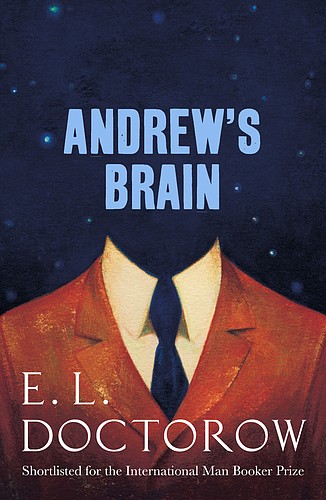- April 25, 2024
-
-
Loading

Loading

How to write about a book that is more concerned with process than with plot? The myriad concerns (written with a poetic hand) of an unlucky cognitive scientist regarding consciousness and self-estrangement; a book in the form of a conversation between two people — Andrew and Doc — that sometimes feels like three people (Andrew, Andrew, and Doc) recursive at every turn; hazy lines demarcating real and imagined life — a straightforward narrative these ideas do not make.
Make no mistake: E.L. Doctorow’s newest novel, “Andrew’s Brain” has plot aplenty, but the way in which Doctorow unpacks Andrew’s story, through the filter of a man with a brain gone wild, is the real triumph of this odd little book.
Tragedy seems to follow Andrew around — from his childhood dog kidnapped by a bird of prey on a walk to the accidental death of his newborn baby at his own hand to the death of his very young second wife during a national emergency — we are witness to a man convinced that his own existence causes harm to the ones he loves.
Not only that. Andrew hears soundless voices, sees phantoms in the night. Andrew sometimes talks about himself in the third person. Andrew has dream visions that come to fruition. Andrew says things like, “How can I think about my brain when it’s my brain doing the thinking?” to his undergraduate students before running out of class.
This is Andrew’s brain: dissociating from itself. “This too is the brain’s cunning,” he tells Doc, in what seem to be mandatory psychotherapy sessions, “that you are not to know yourself.” If Andrew doesn’t truly know himself — perhaps because he’s had a legitimate break with reality as the result of too much tragedy — neither does the reader know with any certainty which parts of his story are true, which parts imagined — or even where Andrew is in time and place during his telling (I vote mental hospital).
Doctorow plays with complex ideas here — questions neuroscience has been asking for a long time — when does the brain, for instance, become the mind? Neuroscientist Joshua Greene calls brain science “the soul’s last stand.” As if in echo, Andrew tells Doc that our brains are pretenders: acting like the soul — perhaps to comfort us in times of deep grief. Ultimately, brain science gives way to suffering for Andrew in the intersection between personal and public tragedy. What else is a brilliant mind to do but unravel with the weight of it all?
“Andrew’s Brain” is available at Bookstore1, 1359 Main St., Sarasota. Call 365-7900.
Top 10 fiction titles at Bookstore1 this month:
“Dr. Sleep” by Stephen King
“The Goldfinch” by Donna Tartt
“The Obituary Writer” by Ann Hood
“A Hologram for the King” by Dave Eggers
“Above Suspicion” by Helen Macinnes
“The Secret History” by Donna Tartt
“Slow Man” by J.M. Coetzee
“City of Thieves” by David Benioff
“The 100-Year-Old Man Who Climbed Out the Window and Disappeared” by Jonas Jonasson
“The Dinner” by Herman Koch